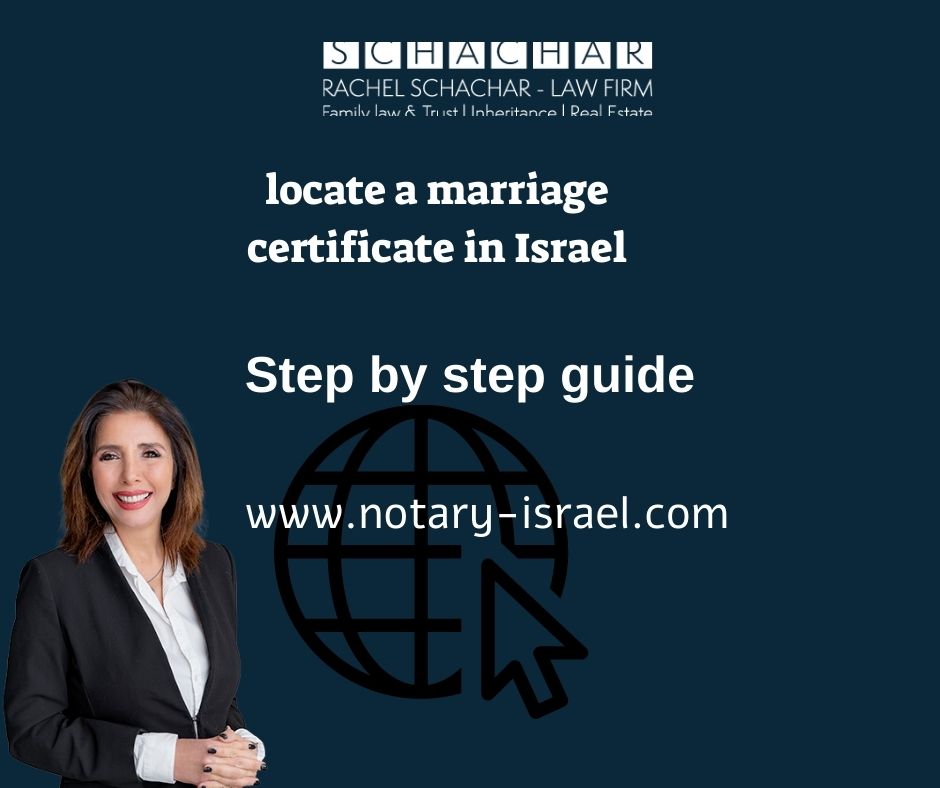If you are looking to locate a marriage certificate in Israel , there are several steps you can take to obtain a copy of this important document. Marriage certificates are typically issued by the Ministry of Interior, and obtaining a copy requires submitting a request to the appropriate government agency.
Here are the steps to follow in order to locate a marriage certificate in Israel
Step 1: Determine the location of the marriage
The first step in obtaining a marriage certificate is to determine where the marriage took place. In Israel, marriages can take place in a variety of settings, including religious institutions, secular venues, and civil ceremonies. Depending on where the marriage occurred, you may need to contact different government agencies to obtain a copy of the certificate

Step 2: Contact the appropriate government agency
Once you have determined where the marriage took place, you will need to contact the appropriate government agency to request a copy of the marriage certificate. If the marriage was registered with the Ministry of Interior, you can contact the Ministry’s Population and Immigration Authority to obtain a copy of the certificate. If the marriage took place in a religious institution, you will need to contact the appropriate religious authority (e.g. the Chief Rabbinate for Jewish marriages)
Step 3: Submit a request for the certificate
To submit a request for a marriage certificate, you will need to provide some basic information about the marriage, including the names of the individuals who were married, the date of the marriage, and the location where the marriage took place. You may also need to provide some form of identification, such as a passport or Israeli ID card.
Step 4: Pay the fee
In most cases, there will be a fee associated with obtaining a copy of a marriage certificate in Israel. The fee can vary depending on the agency you are working with and the type of certificate you are requesting. You will need to pay the fee before your request can be processed.
Step 5: Wait for the certificate to be processed
Once you have submitted your request and paid the fee, you will need to wait for the agency to process your request and provide you with a copy of the marriage certificate. The processing time can vary depending on the agency and the volume of requests they are receiving.
In conclusion, obtaining a marriage certificate in Israel requires some basic research and the submission of a formal request to the appropriate government agency. By following these steps, you can locate and obtain a copy of your marriage certificate in Israel.
how to provide a notarized translation of your marriage certificate
If you are an Israeli citizen interested in studying in a country outside of Israel, you may need to provide a notarized translation of your marriage certificate as part of your application process. In order to do this, you will need to follow a few simple steps to ensure that your translation is accurate and meets the requirements of the institution you are applying to.
Step 1: Find a qualified translator
The first step in translating your notarized marriage certificate is to find a qualified translator who is able to provide a certified translation. Look for a translator who has experience with legal documents and is able to provide a notarized translation that meets the requirements of the country you are applying to.
Step 2: Provide the original notarized marriage certificate
In order to ensure that your translation is accurate, you will need to provide the translator with the original notarized marriage certificate. This will allow them to verify the information on the certificate and ensure that the translation is correct.
Step 3: Review the translation
Once the translation is complete, take the time to review it carefully to ensure that all of the information is correct and accurate. Check that all of the dates, names, and other details are translated correctly.
Step 4: Obtain a notarized copy of the translation
In order for the translation to be considered valid, you will need to obtain a notarized copy of the translation. This can be done by taking the translated document to a notary public, who will verify the authenticity of the translation and provide you with a notarized copy.
Step 5: Submit the notarized translation with your application
Once you have obtained a notarized copy of the translation, you will need to submit it along with your application to the institution you are applying to. Make sure to follow any specific instructions provided by the institution regarding the submission of documents, and keep a copy of the notarized translation for your records.
In conclusion, translating a notarized marriage certificate for the purposes of studying in another country requires finding a qualified translator, providing the original notarized certificate, reviewing the translation, obtaining a notarized copy, and submitting the translation with your application. By following these steps, you can ensure that your translation meets the requirements of the institution you are applying to and is accurate and valid.
need to translate a notarized marriage certificate from Israel
If you are an Israeli citizen living abroad and need to translate a notarized marriage certificate from Israel for use in a foreign country, there are several steps you can take to ensure that the translation is accurate and valid. Here is a guide on how to translate a notarized marriage certificate from Israel when you are living abroad and need to receive it in a foreign country.
Step 1: Find a qualified translator
The first step in translating your notarized marriage certificate is to find a qualified translator who can provide a certified translation. Look for a translator who has experience with legal documents and is able to provide a notarized translation that meets the requirements of the country you are currently living in.
Step 2: Obtain a copy of the notarized marriage certificate
In order to ensure that the translation is accurate, you will need to obtain a copy of the notarized marriage certificate from Israel. This can be done by contacting the appropriate government agency or requesting a copy through an online service.
Step 3: Provide the translator with the original notarized marriage certificate
Provide the translator with the original notarized marriage certificate. This will allow them to verify the information on the certificate and ensure that the translation is correct.
Step 4: Review the translation
Once the translation is complete, take the time to review it carefully to ensure that all of the information is correct and accurate. Check that all of the dates, names, and other details are translated correctly.
Step 5: Obtain a notarized copy of the translation
In order for the translation to be considered valid, you will need to obtain a notarized copy of the translation. This can be done by taking the translated document to a notary public in the country you are currently living in.
Step 6: Legalize the notarized copy of the translation
Depending on the country you are in, you may need to have the notarized copy of the translation legalized by the appropriate government agency. This will typically involve submitting the document to the relevant embassy or consulate for authentication.
Step 7: Submit the notarized, legalized copy with your application
Once you have obtained a notarized, legalized copy of the translation, you can submit it along with your application to the institution or organization that requires it. Make sure to follow any specific instructions provided by the institution regarding the submission of documents.
In conclusion, translating a notarized marriage certificate from Israel when you are living abroad and need to receive it in a foreign country requires finding a qualified translator, obtaining a copy of the notarized certificate, reviewing the translation, obtaining a notarized copy of the translation, legalizing the notarized copy, and submitting the document with your application. By following these steps, you can ensure that your translation is accurate, valid, and meets the requirements of the institution or organization you are submitting it to.




